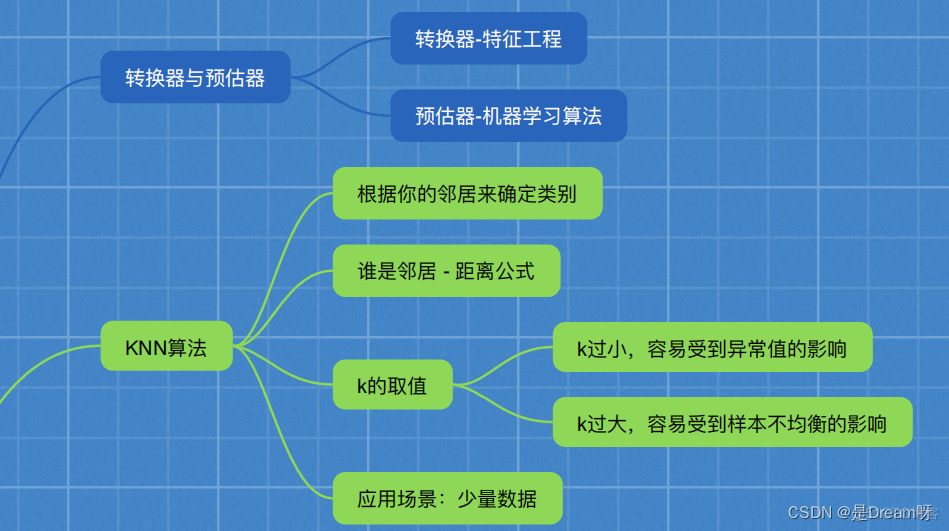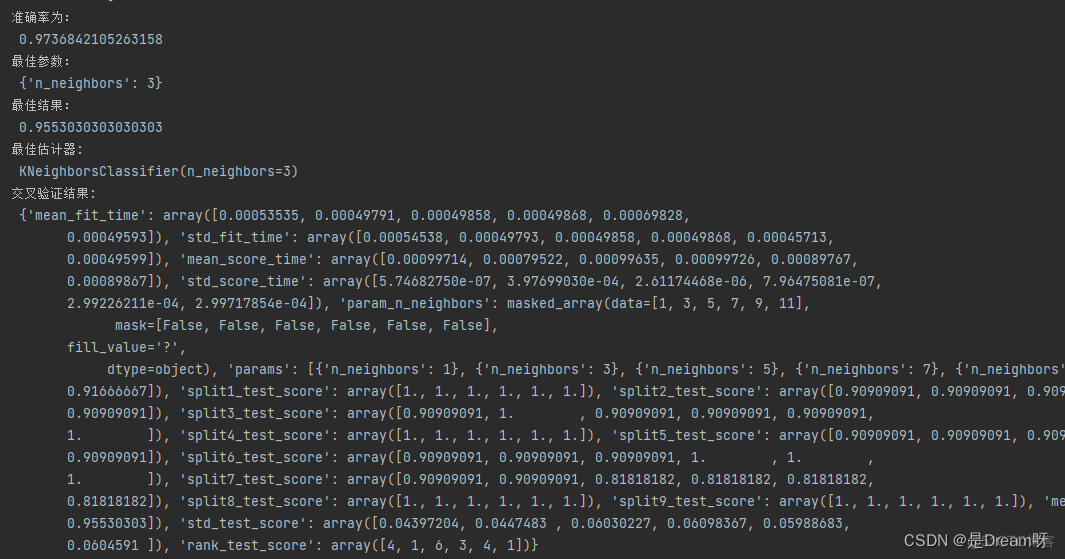1、为什么需要交叉验证 交叉验证目的:为了让被评估的模型更加准确可信 2、什么是交叉验证(cross validation) 交叉验证:将拿到的训练数据,分为训练和验证集。以下图为例:将数据分


1、为什么需要交叉验证
交叉验证目的:为了让被评估的模型更加准确可信
2、什么是交叉验证(cross validation)
交叉验证:将拿到的训练数据,分为训练和验证集。以下图为例:将数据分成5份,其中一份作为验证集。然后经过5次(组)的测试,每次都更换不同的验证集。即得到5组模型的结果,取平均值作为最终结果。又称5折交叉验证。
2.1 分析
我们之前知道数据分为训练集和测试集,但是为了让从训练得到模型结果更加准确。做以下处理
- 训练集:训练集+验证集
- 测试集:测试集
 问题:那么这个只是对于参数得出更好的结果,那么怎么选择或者调优参数呢?
问题:那么这个只是对于参数得出更好的结果,那么怎么选择或者调优参数呢?
3、超参数搜索-网格搜索(Grid Search)
通常情况下,有很多参数是需要手动指定的(如k-近邻算法中的K值),这种叫超参数。但是手动过程繁杂,所以需要对模型预设几种超参数组合。每组超参数都采用交叉验证来进行评估。最后选出最优参数组合建立模型。
3.1 模型选择与调优
sklearn.model_selection.GridSearchCV(estimator, param_grid=None,cv=None)
- 对估计器的指定参数值进行详尽搜索
- estimator:估计器对象
- param_grid:估计器参数(dict){“n_neighbors”:[1,3,5]}
- cv:指定几折交叉验证
- fit:输入训练数据
- score:准确率
- 结果分析:最佳参数:bestparamsprint("最佳参数:\n", estimator.bestparams)最佳结果:bestscoreprint("最佳结果:\n", estimator.bestscore)最佳估计器:bestestimatorprint("最佳估计器:\n", estimator.bestestimator)交叉验证结果:cvresultsprint("交叉验证结果:\n", estimator.cvresults)
3.2鸢尾花案例增加K值调优
def knn_iris_gscv(): """ 用KNN算法对鸢尾花进行分类,添加网格搜索和交叉验证 :return: """ # 1)获取数据 iris = load_iris() # 2)划分数据集 x_train, x_test, y_train, y_test = train_test_split(iris.data, iris.target, random_state=22) # 3)特征工程:标准化 transfer = StandardScaler() x_train = transfer.fit_transform(x_train) x_test = transfer.transform(x_test) # 4)KNN算法预估器 estimator = KNeighborsClassifier() # 加入网格搜索与交叉验证 # 参数准备 param_dict = {"n_neighbors": [1, 3, 5, 7, 9, 11]} estimator = GridSearchCV(estimator, param_grid=param_dict, cv=10) estimator.fit(x_train, y_train) # 5)模型评估 # 方法1:直接比对真实值和预测值 y_predict = estimator.predict(x_test) print("y_predict:\n", y_predict) print("直接比对真实值和预测值:\n", y_test == y_predict) # 方法2:计算准确率 score = estimator.score(x_test, y_test) print("准确率为:\n", score) # 最佳参数:best_params_ print("最佳参数:\n", estimator.best_params_) # 最佳结果:best_score_ print("最佳结果:\n", estimator.best_score_) # 最佳估计器:best_estimator_ print("最佳估计器:\n", estimator.best_estimator_) # 交叉验证结果:cv_results_ print("交叉验证结果:\n", estimator.cv_results_) return None
